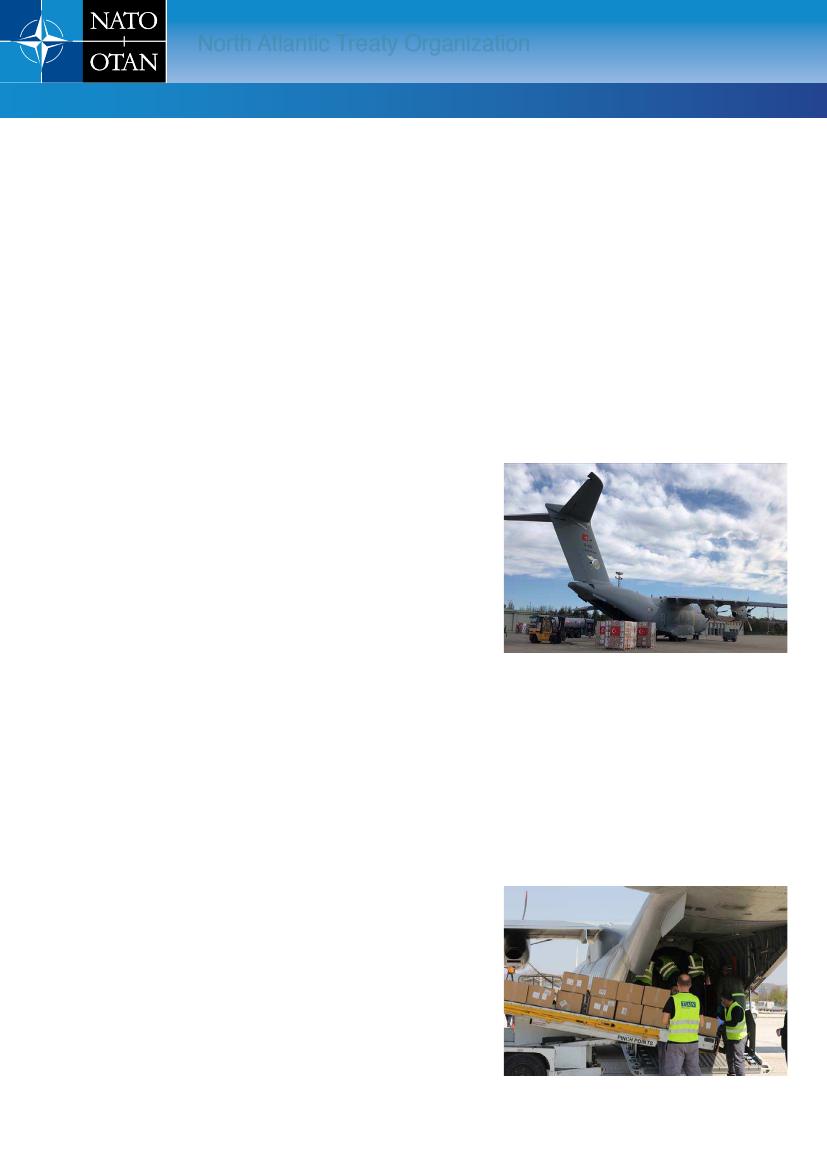
North Atlantic Treaty Organization
www.nato.int/factsheets
Factsheet
14 April 2020
NATO’s Response to the COVID-19 Pandemic
In responding to the COVID-19 pandemic, NATO continues to deliver credible and effective deterrence and defence. Our ability to
conduct operations has not been undermined, our forces remain ready, and our crucial work goes on.
From the start of the outbreak, NATO has implemented robust measures to limit the spread of the virus and minimise risks to our
personnel and the communities they serve. NATO military medical staff remain vigilant and are monitoring for any impact on NATO
forces deployed on operations.
NATO is also a platform for sharing information and best practice among Allies. As part of NATO’s work to strengthen resilience, we
have been working with Allies for years to enhance preparedness across the whole of government, including in the health sector.
Allies continue to stand together and support each other in this pandemic, through different NATO arrangements, as well as bilaterally.
Allied armed forces across the Alliance are also playing an essential role in supporting national civilian efforts.
NATO and Allied Measures
•
Allied armed forces
are playing a vital role in supporting national civilian
responses across the Alliance. This support includes logistics and planning,
field hospitals, the transport of patients, disinfection of public areas, and
at border crossings.
NATO’s Euro-Atlantic Disaster Response Coordination Centre
(EADRCC)
is an important tool helping to provide relief to Allies and
partners. It is NATO’s principal civil emergency response mechanism in
the Euro-Atlantic area. The Centre operates on a 24/7 basis, coordinating
requests from NATO Allies and partners for help, as well as offers of
assistance to cope with the consequences of major crises such as the
COVID-19 pandemic.
For example,
in response to requests for assistance
Turkish military A400M Aircraft being loaded with medical
from North Macedonia, Montenegro and Bosnia and Herzegovina, on
equipment for the United Kingdom at Ankara airbase, TUR.
8 April Turkey provided all three countries medical supplies, including
Photo by TUR MOD.
protective clothing, masks and test kits. On 9 April, in response to a request
by Spain, Luxembourg donated 1,440 kilos of TYVEK material to make
protective equipment for health personnel. Earlier, in bilateral aid to North Macedonia, Hungary provided 100,000 masks and 5,000
protective suits and Slovenia provided 200,000 masks. The U.S. Government has committed $1.1 million to mitigate the spread
of the COVID-19 outbreak in North Macedonia. North Macedonia received a field hospital donated by Norway, allowing it to
double the capacity at the Infectious Disease Clinic at Skopje’s largest hospital in the combat against Covid-19. Norway also donated
medical supplies to North Macedonia worth 180,000 Euro. In response to Spain and Italy’s requests for assistance made through
the EADRCC, the Czech Republic bilaterally provided both countries with medical supplies, including 10,000 protective medical
suits each. Through the same mechanism, Turkey provided Italy and Spain with medical supplies such as masks, personal protection
equipment and disinfectants.
The
NATO Support and Procurement Agency (NSPA)
has a leading
role in responding to the crisis. The NSPA provides logistics support and
the organisation of transport of key supplies and equipment to Allies,
partners and other international organisations. As of 11 April, the NSPA
has delivered Intensive Care Unit ventilators to Italy, personal protective
equipment to Spain and medical supplies to Norway. Earlier, the NSPA had
helped Luxembourg increase its hospital capacity by providing field hospital
tents, mobilising equipment in less than 24 hours.
NATO supports the
Strategic Airlift International Solution (SALIS)
programme. The programme enables participating Allies to charter
commercial transport aircraft.
For example,
on 10 April Poland used
SALIS to import 190,000 masks and 180,000 protective suits. Earlier, the
Czech Republic and Slovakia have used SALIS to import planeloads of
medical supplies, including facemasks, surgical gloves and protective suits.
•
•
•
Military transport aircraft CASA of the Czech Army transporting
1,000,000 masks to North Macedonia.